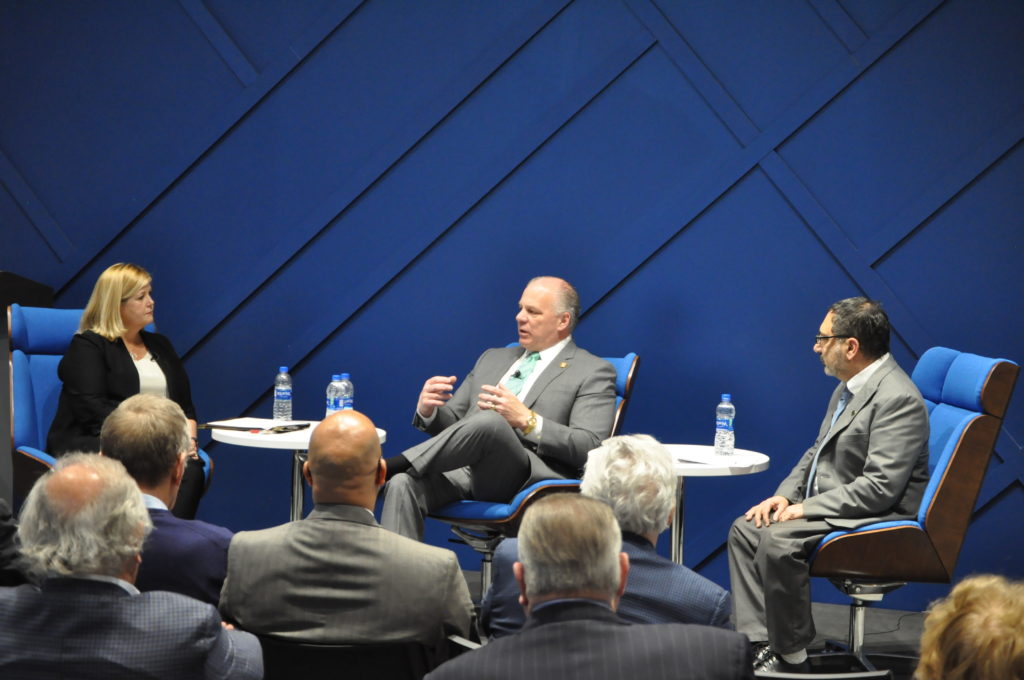Live Video: Senate President Sweeney's Town Hall At Stockton University

New Jersey Senate President Sweeney will discuss his Path to Progress (the report of the New Jersey Economic and Fiscal Policy Working Group), which will be followed by a town hall style question-and-answer session with the audience, starting at 3pm.
The report covers pension and benefit reform, education reform, county and municipal government reform and shared services, and state and local government tax structure.
The event is sponsored by the Southern New Jersey Development Council and the William J. Hughes Center for Public Policy. It will be moderated by Stockton alumna Brigid Callahan Harrison, a political science and law professor at Montclair State University and John Froonjian from the William J. Hughes Center for Public Policy at Stockton University.
Sweeney's office released the following statement on the event:
Sweeney Joins In Stockton’s ‘Town Hall At Atlantic City’
Public Forum Puts Focus on ‘Path to Progress,’ Including Merger of Health Benefits Programs
Atlantic City – Speaking at a Town Hall meeting held by Stockton University at Atlantic City today, Senate President Steve Sweeney emphasized the need to confront the state’s mounting fiscal problems so that we can make critical investments in education, transportation, higher education and social services, among other priorities.
Hosted by Stockton alumna Brigid Callahan Harrison, professor at Montclair State University, and John Froonjian from Stockton’s William J. Hughes Center for Public Policy, the forum included a discussion about the fiscal reforms in the “Path to Progress” report.
“We have to face up to the reality of the deep fiscal crisis we are facing,” said Senator Sweeney. “We can’t grow our way out of it, we can’t tax our way out of it, and it won’t go away by ignoring it. If we refuse to make the needed reforms, we won’t have the ability to fully fund our schools, lower college tuition costs, take over Special Education costs, fix NJ Transit or make other investments for the people of New Jersey.”
Senator Sweeney said the recommendations of the bipartisan Economic and Fiscal Policy Workgroup of economists, tax policy experts and academics provide a workable blueprint for the reforms needed to control the costs of government before they continue to grow out of control. The reforms were incorporated into the report.
The proposals address soaring pension and benefit costs, hold down property taxes, make government and school districts more efficient, assess the efficiency of our tax structure and leverage state assets.
Senator Sweeney has also called for the merger of the high-cost School Employees Health Benefits Plan into the lower-cost State Health Benefits Plan to take advantage of the cost savings negotiated by the Governor and the state’s largest public workers union. Combining the two healthcare plans will be a cornerstone of a legislative package that will be introduced to implement recommendations of the bipartisan Economic and Fiscal Policy Workgroup.
“While the state employee unions worked hard to find savings, the SEHBP has gotten so expensive that it has lost one-third of its members since 2014,” said Senator Sweeney. “It makes no sense for a teacher making $75,000 to pay up to $8,718 for the premium on an SEHBP family plan when a state worker making the same amount only has to pay $5,438 in the SHBP. Teachers and taxpayers are both paying too much.”
Senator Sweeney repeated his pledge that the Path to Progress legislative package will not include legislation requiring retirees to pay more for their healthcare coverage.
“While New Jersey is unique in charging retirees less than current employees for their healthcare coverage, we recognize that living costs are high, and we will not be asking retirees to pay more,” Sweeney said. “In fact, we want everyone to pay less.”
Brigid Callahan Harrison, one of the hosts of the forum, welcomed the session.
“These town halls provide forums for public discussions on the issues that have an immediate and long-term impact on the lives of the people of New Jersey,” said Harrison, who hosted a similar town hall at Montclair University. “They are especially valuable for students and university communities, where they are part of an educational process on how government and politics operate.”





